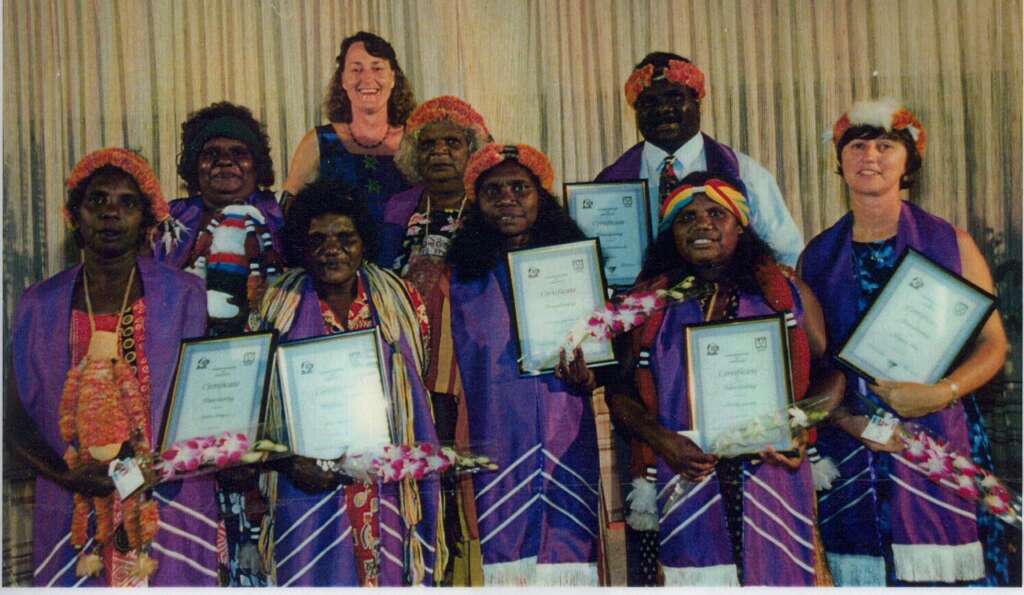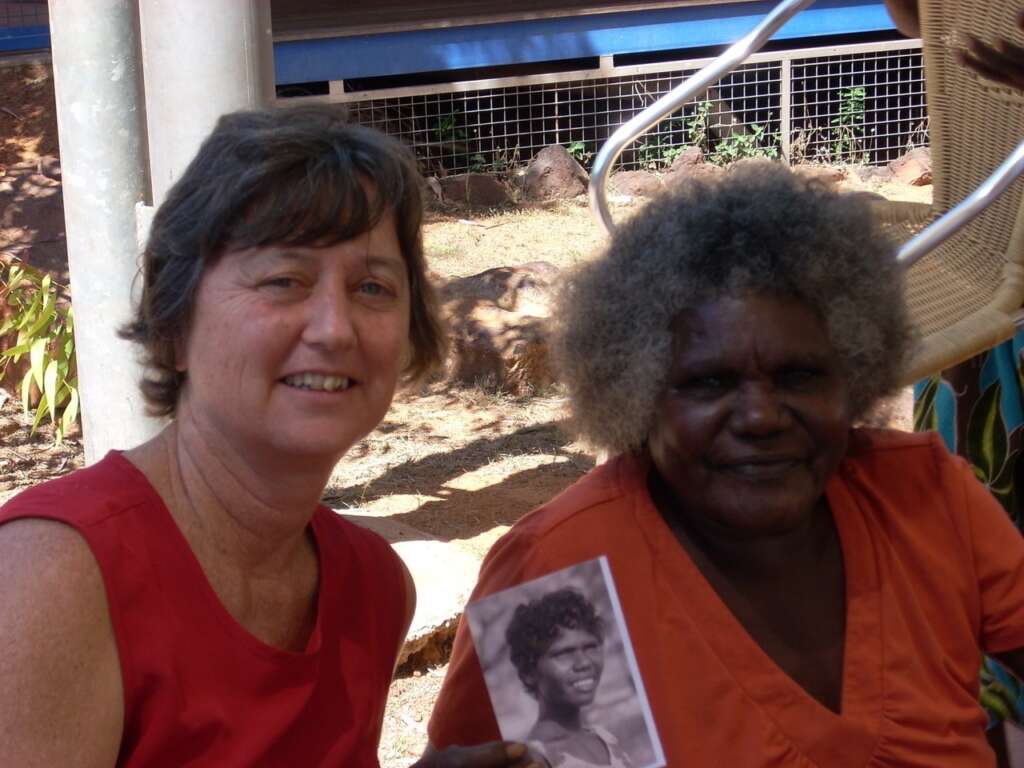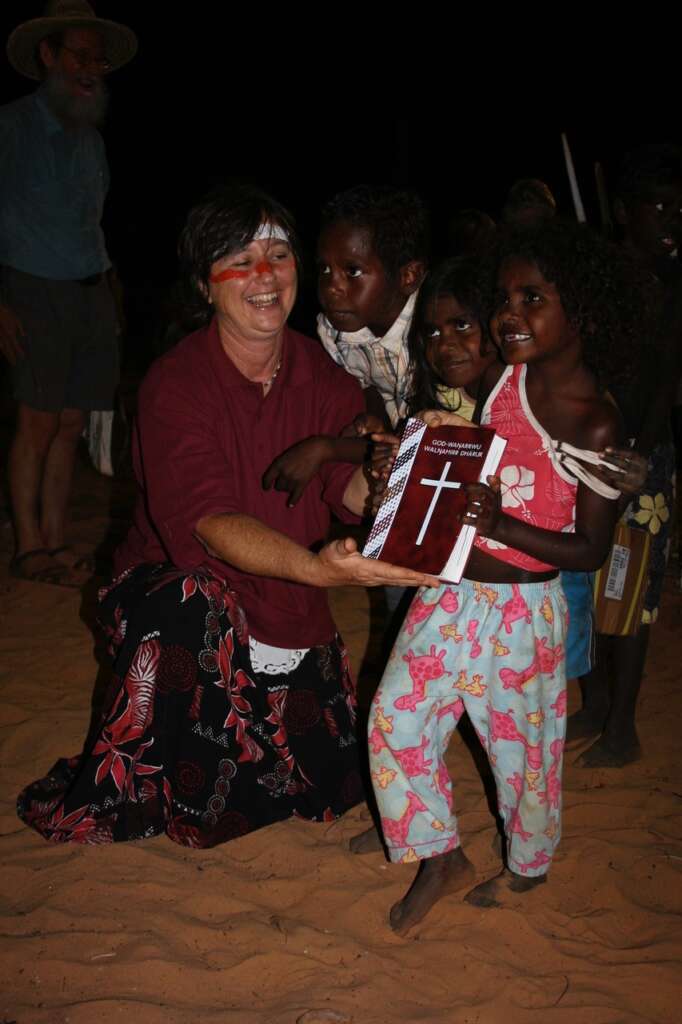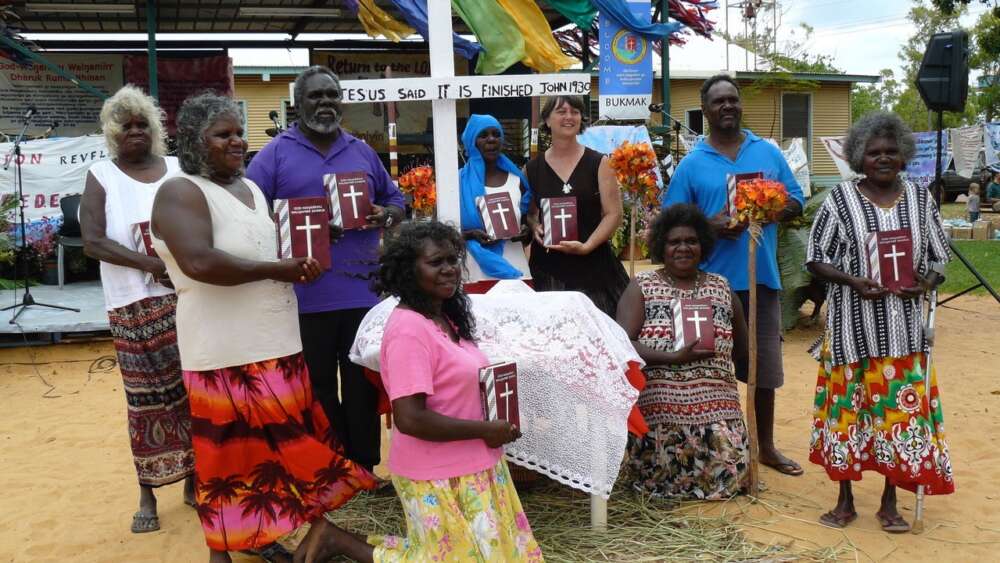A voyage of overcoming obstacles to walk with Indigenous Christians
It took a conversation with God while watching the burning of two stumps to convince Margaret Miller to continue helping Indigenous Bible translators’ voices to be heard and support their work.
Supporting the Bible translation work in the Uniting Church, Margaret was feeling bereft because her partner in an Indigenous Bible translation team, Dianne Buchanan, had recently died of cancer and Margaret was questioning how the Djambarrpuyŋu Bible translation project could go forward without its leader.
Soon after Dianne’s death, Margaret spent a pivotal weekend in a remote Christian homeland community called Dharrwar on Elcho Island, where she visited an outdoor chapel on a hill. As she approached the chapel, Margaret noticed some tree stumps in the pathway that had to be walked around.
“I was thinking ‘They’re really in the wrong spot – someone is going to trip over these stumps,’” Margaret relates.
“This lovely little chapel has got God’s fingermarks all over it. It just draws you into acknowledging our creator and worshipping him So we had this lovely worship time and came out of there. And as we’re walking back over this pathway, there are these stumps.”
Irritated by the obstacles, Margaret asked permission to burn the stumps, then got some matches, and some deadwood and built up two big fires.
As she sat on a log at a safe distance watching the flames, Margaret pondered what she was going to do now that she had lost Dianne – “the keeper, my umbrella who looked after everything.”
“I’m feeling quite empty, bereft, grieving the loss of her. And what’s the translation work going to be doing in the next few years? Will it ever go forward?”

1998 CIT Djambarrpuyŋu graduands with teaching staff, Mally McLellan
Then two of her translation colleagues arrived to tell her they were staying on for fellowship that night on the beach and could she share a devotion?
“I go, ‘What? I have nothing in me to share.’ And they ambled off and left me with the task. I just cried out to the Lord, ‘Lord, what can I say? I’m absolutely empty, got no gas in the tank at all.’
“’Can’t you see?’ was the word that came back. I said, ‘see what?’ ‘You’re watching two stumps.’ ‘Yeah, what about the two stumps?’ ‘You’re burning them.’ ‘Yes, that’s right.’ ‘Don’t you remember the verse that I gave you and Dianne at the beginning of the year? Sanctify yourselves for I will do wonders in your midst tomorrow – Joshua 3:5.’
“And it’s like this little conversation between me and the Lord while I sat quietly on this log waiting for these stumps to burn. ‘Well, look at the stumps.’ See, one was a dead stump; the other one had some green shoots coming out of it. ‘Can’t you see? That’s you and Dianne. I want you to be sanctified and in that way, you will be like this pathway. You need to make a way clear for others, so they will not trip over as they go and worship in that place’”
This story still brings tears to Margaret’s eyes every time she tells it because it is a burning story – and she sees that God “wants to burn hearts, sanctify hearts, purify us.”
Margaret’s first three years supporting the Djambarrpuyŋu Bible Translation team in the Uniting Church from 1990 to 93 had been full of unsettling dramas.
Not only had Dianne Buchanan died but three translators/linguists involved in other Indigenous Bible programs across north Australia had also died of cancer within a three-month period.

Margaret with her with her Aboriginal mother and close colleague in Coordinate work, Mary Ŋändama (early 2019)
“So it really shook all the Bible Translation operations right across the north,” Margaret says.
The remnants of the mission era were still in play when Margaret switched from teaching in a bilingual education program at the government school on Elcho Island to supporting the Djambarrpuyŋu Translation Team. Her Aboriginal mother, Mary Ŋändama, was also convicted to make the switch and they formed a very tight partnership in the Scripture in Use part of the team.
Their careers coincided with a revolution in Indigenous Bible translation away from the mission-led era towards an Indigenous-empowered operation.
Within Arnhem Land, a revival began in 1979. Margaret had arrived on Elcho in 1981 to witness its continuing effects both in the church and community life. She witnessed Indigenous believers expressing a unique style of fellowship – worship under their own leadership. She was learning so much from their faith and fellowship in the Lord as she lived alongside them on the island. At that time, Aboriginal Christian leaders within the Uniting Church established the Uniting Aboriginal and Islander Christian Congress – the UAICC – or Congress.

Celebrating the arrival of the Djambarrpuyŋu New Testament, 2008
When Margaret joined the Djambarrpuyŋu project in 1990, five-eighths of the New Testament had been completed, which was enough to publish a Mini-Bible. But in God’s wonderful timing, just as the team was crying out to complete their New Testament, a training program for Indigenous translators – the Certificate in Translating – became available. Mally McLellan was deeply involved in delivering this training.
“So in the 90s, we shifted from being a mission-style operation into something that was resembling more of an Indigenous operation where we started with five Indigenous members that quickly grew to eight,” says Margaret.
“And when this CIT course was being developed, the timing was just brilliant … So with other teams who had also been affected by this major loss, we moved into training and there was a big shift that was developing of Indigenous engagement in translation work.”
By 2008, with the completion of the Djambarrpuyŋu New Testament, the work style was totally different from when the mini-Bible had been completed with Dianne.
When the future of any further Bible translation work was debated at the Uniting Church Synod, all four areas of the Aboriginal ministry that had been growing appealed for a renewed focus on Indigenous Scriptures. This led to a unanimous decision to set up a new project to address all of the translation issues across the Northern Synod.
“That’s when Coordinate formed and in its fledgling years, the Djambarrpuyŋu Bible translation project basically morphed into being an East Arnhem work across the region. Coordinate continues to mirror the structures of church life in Northeast Arnhem, providing support for Indigenous scriptures in all those churches,” Margaret says.
“So that shifted the operations for each of the translators who were actively involved in the Djambarrpuyŋu Translation project, who wanted to continue doing something in that vein, were able to assist with a broader perspective across the region.”
In recent years, Margaret has supported Gumatj speaker Djotarra Baŋaḏitjan (Rosemary B Burarrwaŋa), who spent many hours, checking the 27 books of the reprinted Gumatj New Testament, which was dedicated in early April.
She describes her work as “filling the gaps to Indigenous translators on the ground, meeting their needs by connecting them with the skills and expertise to support their work.”
“So my role is facilitating the voices and the expressed desires of having God’s word in languages of Northeast Arnhem Land.”
Currently, she is facilitating a broader group of Aboriginal translators volunteering in nine languages in Northeast Arnhem Land, although for the past couple of years she has been working remotely to support her mum in Sydney.
Thinking back to her experience at the outdoor chapel, she says every time she visits the cleared pathway, she reflects on her journey with God, walking alongside Indigenous Australians, seeking to worship God together. In the chapel’s bush setting, Margaret is reminded that God is calling his people from this country, to worship him in a uniquely Australian way.
“These stumps that were in the pathway were a problem for me and my journey with God,” she reflects.
“They were potentially there to trip not only me but also my companions. My conversation with God challenges me to examine my own life and recognise those parts of me that are part of my European cultural baggage, which are not helpful to others … I am the one that has to deal with the obstacles I can see, to be purified of those things in my life that do not draw others to Christ. I must burn them out of my life! It is not for others ‘to get over it’ but for me to remove the obstacles.”
“It is not for others ‘to get over it’ but for me to remove the obstacles.”
For Margaret, the revelation she had while burning the tree stumps is not only a personal one but reveals how God seeks to engage with what’s known as the fourth world – primarily the world of Indigenous people whose land has been conquered and colonised so that they’ve lost control of their world.
“My journey alongside my Indigenous brother and sisters is in a ‘fourth world’ that Indigenous people live in. It is a world that is constantly battling domination, that comes from my culture and overwhelms them, that trips them up,” she explains.
“They’ve got nowhere else to go but to their own lands – they’re in their own country, but they’re dominated by another world. And so that world constantly drives things and it’s actually what exacerbates the gap that we keep talking about. That gap is that tension of the two cultures clashing with each other and the one that constantly comes in and drives things and doesn’t value Indigenous people as equals.”.
“The culture of their country gets constantly oppressed by another. Politically it expresses itself in everyday life all the time of being dominated; and yet, when you’re living in a community and you see the way Indigenous people interact with each other, such as in times like funerals and other ceremonies, it’s just powerful to observe how they manage working together in their own world. But when they engage with that wider Western one, they are overwhelmed. So how can they flourish when the Western world meets with their world?”

Visiting Milingimbi Church elders and Gupapuyŋu translators, 2017
Margaret believes that the gap is closed when the Western world with its agendas is willing to decrease in order for their world to increase – because the Western world has a history of being the opposite.
“It requires us to truly value each other and our cultures. As Christians, but particularly non-Indigenous Christians, the Lord calls us to ‘deny ourselves, take up our cross and follow him.’ This is the sanctifying process that he requires – a burning of our own ways. A different way, prepared to remove what is an obstacle in ourselves for others. Out of that fire of devotion and love for the Lord, we need to express a love for our Indigenous brothers and sisters that lifts them up, that encourages them to walk in a way that is uniquely their own that will be a blessing to all.
“It’s a whole change of mindset, of attitudes in Australia. We may think that we’re here to serve, but that ends up being a takeover! We’ve got this domineering mindset that’s really hard to break, and the Yolngu have lived with it so long now that they accept it and expect it.
“The beauty of my role is that it’s not me doing the driving. There’s a general expectation that ‘Oh, you’ve got the white person there. They’ll come in with their agendas and do it.’ But the core element of what Coordinate is wanting to promote as a project of the church and community requires those of the Western world to quieten down, to walk with Yolngu and listen to their voices, trusting the Lord that he will show a better way of partnership so that Yolngu goals will be achieved.”
Email This Story
Why not send this to a friend?


